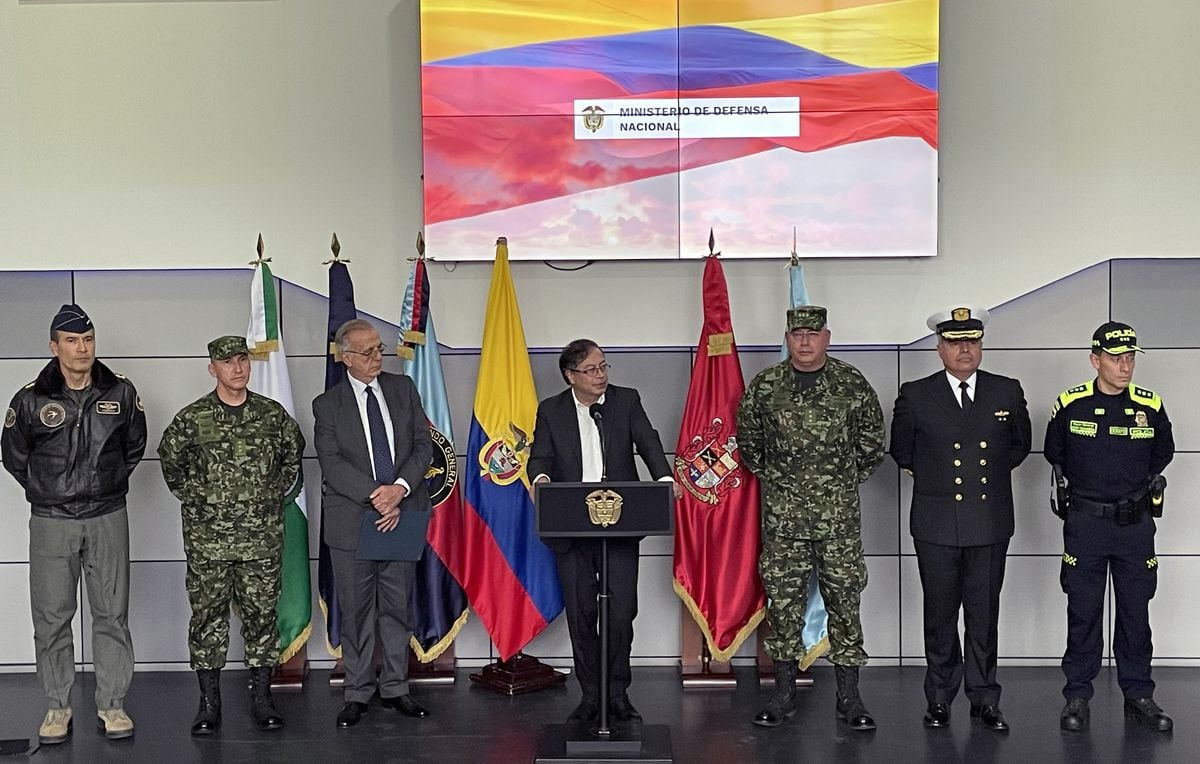From the Ministry of Defense, accompanied by the head of this portfolio and the new military leadership, President Gustavo Petro made public the names of those who will be part of it.
There are five men and a woman that he chose to accompany him in "the construction of a love policy between the public force and Colombian society," as he pointed out today.
In his public intervention, Petro stated that among the selection criteria was "zero violation of fundamental rights and zero corruption", an echo of the message he gave when appointing Iván Velásquez as Minister of Defense.
He also affirmed that he will bet on "a policy of dignity and improvement of the quality of life of the families of the soldiers, of the police officers, of the bases" and reiterated his proposals to have an Armed Forces with a more community,
Several of those chosen come from working in high positions in administrative areas and have training in Human Rights.
This is the new dome:
- The General Commander of the Military Forces will be General Helder Giraldo (Ibagué, 54 years old), of the Army.
Until July he was inspector general of the Army, that is, in charge of fighting corruption.
As director of the schools for professional soldiers and non-commissioned officers, he promoted Human Rights and International Humanitarian Law programs, which fits with the pre-eminence of these issues in Petro's view.
- The head of the Joint Chiefs of Staff will be Vice Admiral José Joaquín Amézquita (Bogotá, 55 years old), an officer with a more organizational than operational career.
A naval engineer, he was chief of naval planning and naval attaché in Washington, and headed the General Maritime Directorate, in charge of the security of maritime traffic.
- The commander of the Army will be General Luis Mauricio Ospina, who comes from being director of the Higher School of War and has a diploma in Human Rights and International Humanitarian Law.
He was commander of the Mobile Brigade No. 3, which makes him the only one of those appointed to have performed military combat tasks.
He supported the Peace Agreement with the FARC-EP in 2016 and like Amézquita, he worked at the embassy in the United States.
- The director of the Police will be General Henry Sanabria Cely, who has spent almost his entire career in Police intelligence.
He is very close to General Óscar Naranjo, former director of the Police and who was vice president of Juan Manuel Santos, since he was his private secretary.
- The deputy director of the Police will be General Yackeline Navarro, who has worked above all on police training and organization tasks, such as the Welfare subdirectorate or the incorporation directorate, a highly sensitive matter for an institution that fails to complete enough income and has argued that cases of abuse are due to the personal qualities of its members.
That Petro has presented her is a message in itself, not only because the deputy directorate does not usually appear with the leadership, in which there are only commanders and director of the Police, but because she is the second woman to be a general in the Police.
- The commander of the Air Force will be General Luis Carlos Córdoba Avendaño (Buga, 53 years old).
He made a career as a transport pilot, not a combat pilot, and comes from being president of Satena, the state aviation company that has served regions not served by commercial airlines and has been run by the military for decades.
- The commander of the Navy will be Vice Admiral Francisco Hernando Cubides (Bogotá, 56 years old).
A naval engineer specializing in submarines, he has a diploma in Human Rights and International Humanitarian Law from the Autonomous University of Bucaramanga.
He was an aide to the Uribe politician Francisco 'Pacho' Santos in 2006, when he was vice president of Álvaro Uribe Vélez, in the last decade he worked mainly in managerial positions in naval education and in naval commands in Cartagena and the Pacific.
Within his speech at the press conference, President Petro was explicit in his message with these appointments: “The message is that, a change, a change of mentalities.
The government changed, the strategies changed,” he said.
According to Jean Carlo Mejía, adviser and consultant on security and defense issues, this is a competent leadership.
However, he warns that the appointment of Navarro and Vargas in the Police implies the departure of at least twenty generals, who have more seniority than them, since in the Colombian Armed Forces you cannot have as chief a person who has less time in the race.
Something similar would occur in the Army, which, according to Mejía, is a strategic error because qualified and experienced people are lost.
Jorge Molina, the director of Conflict and Organized Violence of the Ideas for Peace Foundation (FIP) makes a similar reading.
“The most important message here is one of continuity in the training and selection processes.
The new profiles are closely related to capacity building”.
Although for some retired soldiers seniority should have prevailed, they highlight the trajectory of all those appointed.
And they identify a line: "they show more of a command with a conciliatory tone, than a line of strong commands," a veteran of the armed forces assured EL PAIS.
Subscribe here
to the EL PAÍS newsletter on Colombia and receive all the key information on the country's current affairs.

